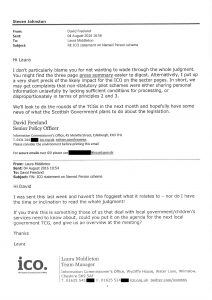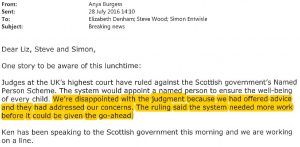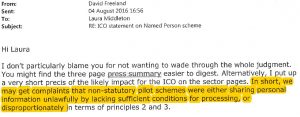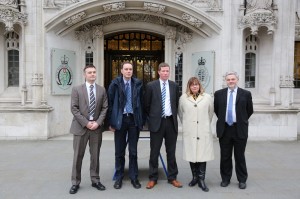Blog
Keeping you up to date on the progress of the Named Person scheme and the NO2NP campaign.
Has the Named Person scheme really been scrapped and where do we go from here?
Posted 6 years agoYesterday Deputy First Minister John Swinney announced in the Scottish Parliament:
“We will now not underpin in law the mandatory named person scheme for every child. We will withdraw the Children and Young People (Information Sharing) (Scotland) Bill and repeal the relevant legislation.
“Instead, existing voluntary schemes that provide a point of contact for support will continue, under current legal powers, when councils and health boards wish to provide them and parents wish to use them.”
Mr Swinney’s announcement led to widespread media coverage, with some containing misleading content. So here we set the record straight.
What named person scheme has been scrapped?
It was a mandatory scheme
The Scottish Government wanted a statutory scheme which would make it mandatory to appoint a Named Person to monitor the ‘wellbeing’ – or ‘happiness’ – of every child in Scotland. Whether the family wanted one or not it would have been imposed, with or without the family’s knowledge.
The proposed scheme was not a ‘voluntary point of contact for parents who wanted it’ as some media reports suggest. If it was a voluntary service, that would have been uncontroversial.
But this was about compulsory state-sanctioned monitoring of every child in Scotland. Parents have spoken out about uncovering detailed dossiers filled with inaccurate information on them, which have been compiled by Named Persons behind their backs and used in damaging ways.
It was about monitoring wellbeing
The proposed scheme tried to give Named Persons legal powers to grab and share information at the low level of ‘wellbeing’. It was not about monitoring welfare as some media reports suggest. Social services and police already have legal powers to monitor welfare concerns.
Professionals working in child protection can already share information if they think there is a ‘risk of significant harm’, and intervene where necessary. The proposed Named Person scheme was not about welfare, but about monitoring ‘wellbeing’.
Commenting on the concept of wellbeing found in the policy, the UK Supreme Court ruling stated: “‘Wellbeing’ is not defined. The only guidance as to its meaning is provided by section 96(2), which lists eight factors to which regard is to be had when assessing wellbeing. The factors, which are known under the acronym SHANARRI, are that the child or young person is or would be: “safe, healthy, achieving, nurtured, active, respected, responsible, and included”. These factors are not themselves defined, and in some cases are notably vague: for example, that the child or young person is “achieving” and “included””.
Elsewhere in the judgment the justices stated:
“[T]he assessment of that wellbeing under section 96… involves the use of very broad criteria which could trigger the sharing of information by a wide range of public bodies… and also the initiation of intrusive inquiries into a child’s wellbeing.”
The judges concluded that sharing private information at the level of ‘wellbeing’ “may in practice result in a disproportionate inference with the article 8 rights of children, young persons and their parents”.
It breached human rights
Let’s remind ourselves what else the July 2016 UK Supreme Court judgment said.
The ruling noted that “the sharing of personal data between relevant public authorities is central to the role of the named person” (para. 78).
It then concluded that these information-sharing provisions:
• Were incompatible with the rights of children, young persons and parents under article 8 of the European Convention on Human Rights;
• May in practice result in a disproportionate interference with the article 8 rights of many children, young persons and their parents, through the sharing of private information;
• Were “not within the legislative competence of the Scottish Parliament”, deeming the legislation “defective” and blocking it from coming into force.
Bizarrely, Mr Swinney responded to the ruling at the time by saying: “I welcome the publication of today’s judgment and the fact that the attempt to scrap the named person service has failed.”
But three years later, he finally has to admit that the mandatory Named Person scheme, with legal powers to grab and share private information at the low level of wellbeing, cannot work without breaching the human rights of children and families.
It had to be scrapped.
So, where do we go from here?
John Swinney said in his statement yesterday: “Instead, existing voluntary schemes that provide a point of contact for support will continue, under current legal powers, where councils and health boards wish to provide them and parents wish to use them.”
A voluntary single point of contact
If you still see a Named Person service being offered, it will now be on a strictly voluntary basis. It will be up to councils and health boards to decide if they wish to offer a voluntary named person or some kind of voluntary single point of contact for parents, and it will be up to parents to decide if they want to use the service.
This ‘voluntary single point of contact’ will not be able to share information on ‘wellbeing’ concerns at will. Instead it will have to adhere to current data sharing frameworks.
There will no longer be a statutory Named Person service imposed on every child in Scotland.
Parents can feel confident that when they are given advice or offered a service by a voluntary ‘Named Person’ or ‘voluntary single point of contact’, they do not have to accept it.
As the 2016 Supreme Court judgment stated: “Care should therefore be taken to emphasise the voluntary nature of the advice, information, support and help which are offered”.
Will this reduce the level of protection for children?
We have always been concerned about the Named Person scheme diverting valuable resources away from vulnerable children who genuinely need help.
A significant case review into the tragic death of Fife toddler Liam Fee stated that the role of the Named Person “may have contributed to confusion”.
And the significant case review into the sad death of Inverness toddler Clyde Campbell mentioned the child’s Named Person, as among those who could have done more.
The report from Highland Child Protection Committee stated serious concerns “were not appropriately escalated to senior social care managers”.
Finding a vulnerable child is like finding a needle in a haystack, and the Named Person scheme, as proposed by the Scottish Government, would have made the haystack bigger, placing an even greater burden on already overstretched child protection services.
Now child protection services can concentrate time and resources on helping children who are genuinely at risk of significant harm.
How to fix the Named Person scheme… Or not
Posted 8 years agoSignificant changes were needed after the UK Supreme Court struck down the information sharing provisions at the heart of the Named Person scheme.
But has the Scottish Government done enough to address the issues?
NO2NP puts the Children and Young People (Information Sharing) (Scotland) Bill to the test.
1. Not in accordance with law
The UK Supreme Court ruled that the Named Person information sharing provisions were not “in accordance with the law”. The legislation breached the rights of children and families under Article 8 of the European Convention on Human Rights.
The Scottish Government managed to pass legislation which was not legal!
A big problem to solve.
So what has been done to make things right?
In a word, not enough.
Judges said: “changes are needed both to improve the accessibility of the legal rules and to provide safeguards so that the proportionality of an interference can be challenged and assessed” (emphasis added) (para. 107).
But this new Bill has failed to resolve these issues.
Anybody trying to understand what the law is will have to simultaneously consider several separate pieces of complex legislation: the Children and Young People (Scotland) Act 2014, the Data Protection Act 1998, the Human Rights Act 1998 and the Draft Code of Practice, as well as the new General Data Protection Regulation (GDPR).
This does not sound very accessible!
How can busy practitioners, those expected to carry out the role of Named Persons who are unlikely to have legal qualifications – particularly teachers and health visitors – be expected to negotiate this area with enough certainty to know that they are able to share information when the rules are spread out across at least four pieces of legislation?
As for providing safeguards against unlawful interference, the Scottish Government has taken a step forward, but the situation is still confusing. It has the opportunity to put proper, clear safeguards on the face of the legislation, and it should do so.
2. Voluntary nature of the Named Person service
The UK Supreme Court also said that the Scottish Government had to make clear that advice from the Named Person is entirely voluntary.
The Policy Memorandum published alongside the 2017 Bill has offered some clarification:
“Children and young people, and their parents, can accept or reject advice, information, support and help offered by a named person under Part 4 of the 2014 Act. … This freedom of choice must be made clear to them. Refusal to accept advice or services offered or refusal to co-operate with a child’s plan is not in itself to be taken as evidence of a risk of harm.”
However guidance is not law. So it’s doubtful that the words about the voluntary nature of the scheme would carry sufficient weight with parents unless it is on the face of the legislation.
Many parents remain unconvinced by the Government’s ‘voluntary nature’ rhetoric, and would prefer a proper ‘opt-out’ to ensure their personal information is not being shared and actions not taken without their full knowledge and informed consent.
3. Definition of wellbeing
The Scottish Government has done nothing to address the “notably vague” definition of wellbeing as identified by the UK Supreme Court. The wellbeing threshold is the driving force of the Named Person scheme. Without a clear definition it will be difficult for practitioners to know what is proportionate and in accordance with the law, leaving individual families at risk of having their human rights breached.
The Faculty of Advocates has also warned that the Scottish Government’s proposed changes don’t go far enough to meet the Supreme Court’s concerns.
Clan Childlaw, a leading children’s legal charity, expressed concern that the Scottish Government’s revised Named Person information sharing legislation wouldn’t fix the issues raised by the UK Supreme Court.
In its written evidence to the Scottish Parliament’s Education and Skills Committee that the bill “fails to overcome the difficulties identified by the Supreme Court, in relation to lack of precision and accessibility, and lack of safeguards and consent”.
We hope the Deputy First Minister and his team will take heed and listen to the serious concerns being raised, so that they are not forced back to the legislative drawing board… again.
Named Person Fact Check: ‘legitimate and benign’
Posted 8 years agoSCOTTISH GOVERNMENT CLAIM:
“Last year the Supreme Court ruled definitively that the intention of providing a Named Person for every child to promote and safeguard their wellbeing was ‘unquestionably legitimate and benign’”
Press release by the Deputy First Minister, 6 March 2017
REALITY:
What the court actually said was:
“The public interest in the flourishing of children is obvious. The aim of the Act, which is unquestionably legitimate and benign, is the promotion and safeguarding of the wellbeing of children and young persons.” (para. 91)
It was “The aim of… the promotion and safeguarding of the wellbeing of children and young persons” that was benign, not the Named Person.
What the court said about the Named Person was:
“…the sharing of personal data between relevant public authorities is central to the role of the named person … the operation of the information-sharing provisions of Part 4… will result in interferences with the rights protected by article 8 of the ECHR” (para. 78).
“It is thus perfectly possible that information, including confidential information concerning a child or a young person’s state of health (for example, as to contraception, pregnancy or sexually transmitted disease), could be disclosed… to a wide range of public authorities without either the child or young person or her parents being aware of the interference with their article 8 rights” (para. 84).
“We conclude therefore that the information-sharing provisions … as currently drafted do not meet the article 8 criterion of being ‘in accordance with the law’.” (para. 85).
The Supreme Court said the confused drafting of the law created “very serious difficulties” for anyone attempting to understand or implement it and expressed “even greater concern” about “the lack of safeguards” [Paragraphs 83-84].
Because of the lack of safeguards “the overriding of confidentiality is likely often to be disproportionate” (para. 100).
They concluded:
“…the information-sharing provisions of Part 4 of the Act are not within the legislative competence of the Scottish Parliament” (para. 106).
“…since the defective provisions are not within the legislative competence of the Parliament, they cannot be brought into force” (para. 109).
After losing the case, the Scottish Government asked the court not to force them to pay their opponents legal costs. They claimed they had only lost on a “relatively limited ground”. The Supreme Court rejected this argument and ordered them to pay all the costs of the case.
Clearly the Supreme Court did not think the Named Person was “legitimate and benign”.
Watch John Swinney’s statement to Parliament on Named Persons today at about 2:20pm: www.scottishparliament.tv
Oops! Info watchdogs exposed in embarrassing email gaffes
Posted 9 years agoInformation watchdogs have been criticised over disparaging comments made in emails when the Scottish Government lost the Named Person legal case.
A senior Information Commissioner’s Officer (ICO) official admitted to a colleague in Scotland she hadn’t “the foggiest” what the historic court judgment was about.
The official, employed in the Cheshire headquarters of the ICO, went on to say that she didn’t have the “time or inclination” to read the decision of the UK Supreme Court, despite it being the biggest ruling affecting the ICO’s work since the Prince Charles letters case.
In response, her colleague David Freeland, a Senior Policy Officer at the ICO’s Edinburgh office emailed back saying: “I don’t particularly blame you”.
He also disclosed that the ICO was aware they could get complaints about information breaches following the ruling.
He wrote, “we may get complaints that non-statutory pilot schemes were either sharing personal information unlawfully by lacking sufficient conditions for processing, or disproportionately”.
In 2014 Mr Freeland controversially told a seminar on information sharing not to offer parents the chance to object to the sharing of private information on them and their children: “Consent is not the be-all and end-all”, he said, lamenting that “Consent can be difficult and it should only be sought when the individual has real choice over the matter”.
The internal emails, revealed in a recent Freedom of Information (FOI) request, also disclosed concerning comments from the head of the ICO in Scotland, Ken Macdonald, who expressed his “disappointment” after judges struck down the Named Person scheme’s intrusive information sharing provisions. The ICO is responsible for protecting the privacy of citizens and upholding the Data Protection Act – the very law the Supreme Court said was breached by the Named Person provisions.
The officials were criticised for their dismissive comments by NO2NP spokesman Simon Calvert, who said:
“The attitude on display here is breath-taking. Are these people so out of touch with the concerns of ordinary families? There’s been massive public anxiety about the Named Person data sharing, yet they say they are ‘disappointed’ when the Supreme Court sides with families and upholds the Data Protection Act.
“The ICO as an independent body has been entrusted to uphold information rights, oversee data protection and investigate complaints from members of the public. Yet here we find ICO officials behaving in a most dismissive manner about a court case which goes to the heart of their work and has profound implications for personal privacy and data protection. It may be the most important case on Data Protection that Scotland has seen, yet officials charged with Data Protection in Scotland don’t seem to think it’s important enough for ICO officials to even bother reading.
“This is the kind of conversation that goes on when officials don’t think the public are listening. It is disturbing that this kind of culture exists within the ICO. Perhaps there should be a review to address the problem.”
He added:
“The comments by Ken Macdonald suggest the ICO is only paying lip service to the idea of being an independent body. They say they are disappointed with a court ruling against the Scottish Government in an action brought with the backing of thousands of ordinary mums and dads concerned about their family privacy. If they were truly independent they would simply accept the ruling.
“The ICO got the law wrong. They failed to protect the public. They should have warned the Government, not collaborated with them. In the wake of the recent court decision to award legal costs against the Government, Mr Macdonald might wish to revisit his views.
“It should also be noted Mr Macdonald has recently had to withdraw flawed advice given to public bodies about the Named Person scheme in light of the decision by the judges.”
The dismissive email exchange between Cheshire-based Laura Middleton, ICO Team Manager, and David Freeland, ICO Senior Policy Officer in Edinburgh, took place on August 4, after they’d heard about the Supreme Court decision.
The ICO is the UK’s independent body set up to uphold information rights and also oversee complaints about freedom of information requests.
Ironically, the emails about the Named Person scheme were obtained by a Freedom of Information request forcing the ICO to make public all their emails on the subject.
The response also reveals there was concern within the Scottish Government before the judges banned them from implementing the Named Person scheme.
Ken Macdonald, Head of ICO Regions, who leads ICO Scotland and was involved in advising the Scottish Government on the issue, wrote an email to Maureen Falconer on 27 July 2016 – the day before the judgment – stating (page 15):
After learning the court verdict, Ken Macdonald wrote in an email on 28 July 2016 to the Wales ICO regional manager and the Deputy Chief Executive (page 14):
Scotland’s ICO chief clearly did not understand the ruling, or even how Parliament operates. The “six weeks” was the time given by the court to allow the parties to make submissions to the court over costs and other issues. It would have been impossible to reconvene Parliament from its summer break and pass new legislation in six weeks.
Another email, from Anya Burgess, Lead Communications Officer, sent to the UK Information Commissioner, the Head of Policy Delivery at ICO and the Deputy Chief Executive on 28 July 2016 stated (page 9):
In another email David Freeland, Senior Policy Officer at the ICO, emailed Laura Middleton, a Team Manager on 4 August 2016 (page 17):
Mr Calvert of NO2NP said:
“What we can see here is anything but independence. This is a one-sided attitude, determined to stand by the Government line, with little regard to the needs of the public or even the actual demands of the law.
“It would seem the ICO is in need of a reminder of its duties and obligations to the people that pay their wages. Action must be taken urgently. Otherwise, how can we be confident they will uphold and enforce the Supreme Court ruling in cases where public authorities have breached privacy law in pursuit of the Named Person scheme? How can we be sure they’ll even read it?”
Scot Gov ordered to pay petitioners’ legal bills
Posted 9 years agoThe Scottish Government has repeatedly tried to claim the Named Person Supreme Court legal challenge failed, even though judges stated that they “unanimously allowed the appeal”.
Now the UK’s highest court has ordered the Scottish Government to pay the legal bills incurred by those who brought the court case, in yet another humiliating ruling for ministers.
The costs for the petitioners, who are all part of the NO2NP campaign, are estimated to top £250,000. The Scottish Government’s own bills will also be substantial, possibly bringing the total to around £500,000.
NO2NP spokesman Simon Calvert commented:
“The Government has been hammered on costs. This is a total and utter vindication of the legal action that we were involved in, and underlines how deeply flawed this illegal scheme was.
“The Scottish Government argued we should pay our own costs. But the judges disagreed, awarding us our costs, further proving that we have been right all along.
“Had the judges agreed with the Government spin that they basically won the case and just had to make a few tweaks to the Named Person law, the court would not have awarded us our costs.”
IN THE MEDIA
The Herald: Half-million pound bill for bungled Named Persons law
STV: Government told to pay legal bill of Named Person opponents
The Scotsman: Government ordered to pay costs for named person court case
Daily Record: Taxpayers facing £500,000 bill as SNP’s controversial named person scheme suffers another court setback
BBC: Scottish government faces named person legal bill
The Daily Telegraph: Taxpayer facing £500,000 legal bill over SNP ‘state guardian’ court battle
The Times: Taxpayers face huge legal bill for named persons
Daily Express: Scottish Government hit with £500K in legal fees as ‘Named Person’ scheme deemed illegal
42 days are almost up… What is Section 102?
Posted 9 years agoMany have been asking what will happen when the 42 days proposed by the UK Supreme Court comes to an end and what exactly is the Section 102 order.
102 Powers of courts or tribunals to vary retrospective decisions
(1) This section applies where any court or tribunal decides that—
(a) an Act of the Scottish Parliament or any provision of such an Act is not within the legislative competence of the Parliament, or
…
(2) The court or tribunal may make an order—
…
(b) suspending the effect of the decision for any period and on any conditions to allow the defect to be corrected..
Section 102 is a mechanism that allows for the suspension of the effect of a court’s decision to strike down a piece of legislation while the problems with it are sorted out.
This is a rarely used constitutional power. Section 102 was intended to be used in cases where the court is proposing to declare a statutory provision which is already in force to be unlawful. In order to avoid resulting chaos from striking down the law, they give the executive a period in which to fix it, while allowing the unlawful law to remain in force and effect.
In this case, the law is not in effect and the UK Supreme Court has declared that it cannot be brought into effect. However, section 102 could allow the UK Supreme Court to keep a supervisory role in settling any replacement legislation.
The 42 days cited in the judgment are for the parties involved in the legal action to make submissions on whether or not the UK Supreme Court should use its section 102 power. At the conclusion of the submissions, the Court could maintain a supervisory role over the Scottish Government/Parliament, given them a period to change the law and guidance into what the Scottish Ministers think to be a Convention compatible form and then re-present this to the court for their approval.
It is certainly not expected that the necessary legislative/guidance changes will be presented to the court within the 42 day period mentioned in the judgment.
Victory! Supreme Court strikes down Named Person scheme
Posted 9 years agoJudges at the UK Supreme Court have declared the Scottish Government’s ‘state snooper’ Named Person scheme to be illegal.
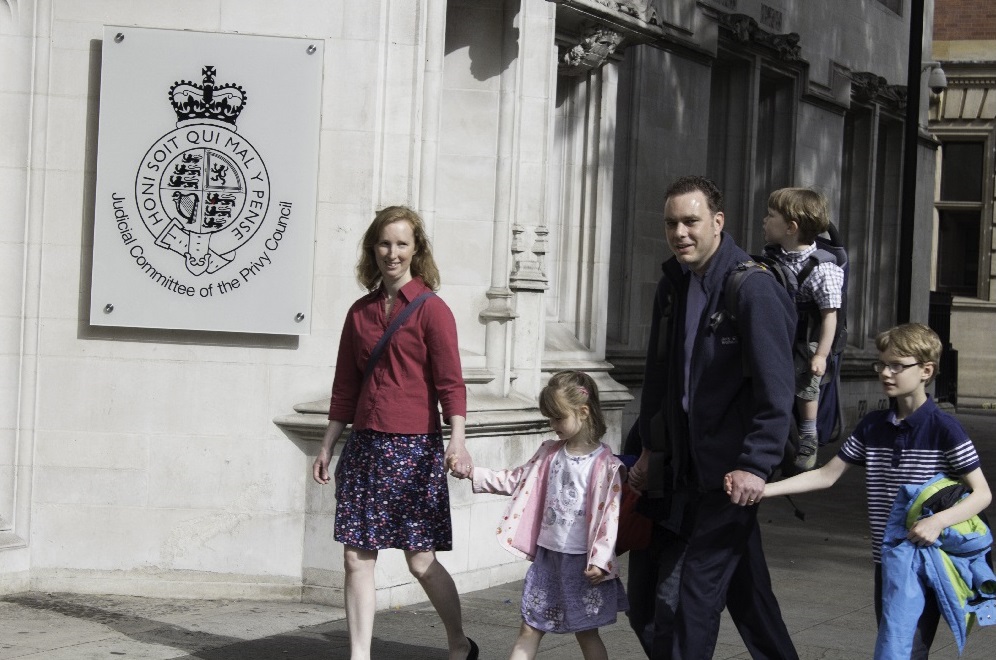
The controversial legislation has been condemned for breaching the human rights of families.
It is the first time the Supreme Court has prevented a major piece of legislation passed by the Scottish Parliament from coming into force.
Unanimous decision
In a historic verdict, five of the UK’s most senior judges, including two Scots, unanimously overturned decisions by the courts in Edinburgh on the legality of the Named Person provisions of the Children and Young People (Scotland) Act 2014.
The judges branded the law “defective” for breaching article 8 of the European Convention on Human Rights (ECHR), which guarantees everyone’s “right to a private and family life”.
They declared Holyrood had exceeded its powers by making a law which allowed public bodies to share sensitive private information about children and parents without consent.
The judges stated:
“The sharing of personal data between relevant public authorities is central to the role of the named person … the operation of the information sharing provisions will result in interferences with the rights protected by article 8 of the ECHR” (Para. 78). Because of the lack of safeguards “the overriding of confidentiality is likely often to be disproportionate” (Para. 100).
They concluded:
“…the information-sharing provisions of Part 4 of the Act are not within the legislative competence of the Scottish Parliament” (Para. 106).
“…since the defective provisions are not within the legislative competence of the Parliament, they cannot be brought into force.” (Para. 109)
NO2NP spokesman Simon Calvert, said:
“We are delighted with the decision, which proves our concerns, and those of the 35,000 people who signed our petition, were properly founded.
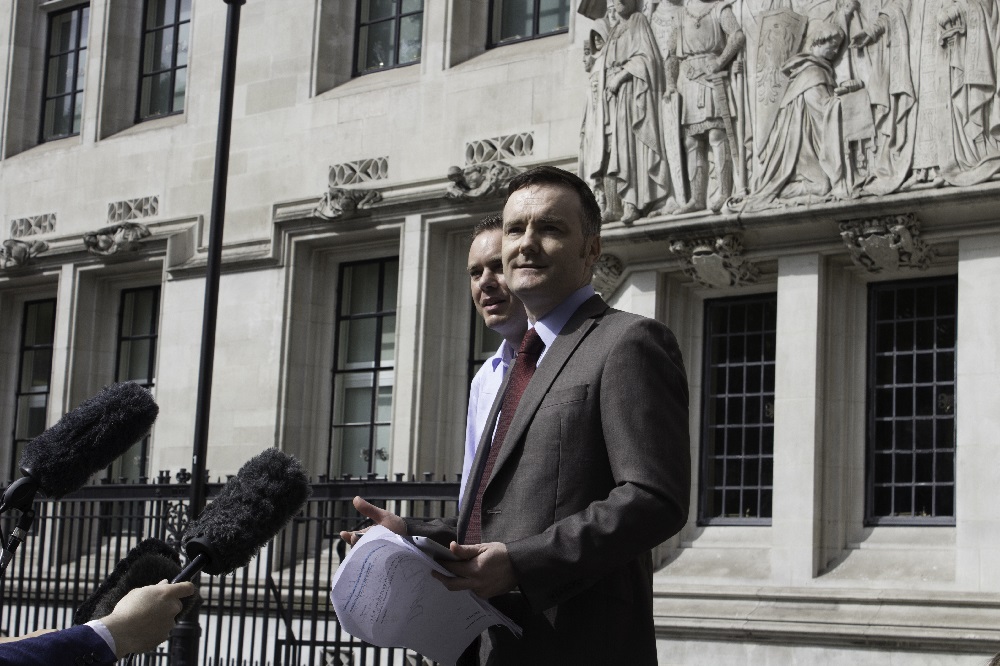
“This proposed scheme was intrusive, incomprehensible and illegal.
“This ruling means the Scottish Government has been blocked from implementing this scheme on August 31. It must scrap its plan for state snoopers with intrusive data sharing powers. It has to go back to the legislative drawing board if it wants to try again. But it would have to come up with a much more limited scheme that actually respects the rights of children and parents.”
“The Big Brother scheme is history.”
“It’s wonderful news for mums, dads and children all across Scotland who no longer have to worry about this unjustified invasion of their private lives. To many of them the Named Person scheme felt like a legal battering ram to gain access to their homes. The court has taken sides with ordinary families and put the Scottish Government back in its place.”
The judgment emphasises the importance of article 8. In a withering verdict on the Government flagship legislation, it said:
“The first thing that a totalitarian regime tries to do is to get at the children, to distance them from the subversive, varied influences of their families, and indoctrinate them in their rulers’ view of the world. Within limits, families must be left to bring up their children in their own way.” (Para. 73)
They also quoted from a US Supreme Court judgment which states:
“The child is not the mere creature of the state” (Para. 73).
To read the judgment or see the hand down visit the UK Supreme Court website.
Supreme Court announces Named Person judgment day
Posted 9 years agoThe UK Supreme Court has announced it will hand down its Named Person judgment on Thursday 28 July at 9:45am.
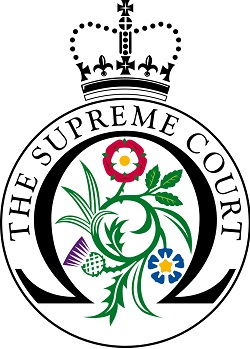
The judgment in the case, which is listed as “(1) The Christian Institute and others (Appellants) v The Lord Advocate (Respondent) (Scotland)”, will be streamed live on the Supreme Court website.
The fight to oppose the Scottish Government’s Named Person legislation continued to the UK Supreme Court after judges in Scotland’s highest court ruled last year that the legislation did not conflict with human rights or data protection laws.
A two-day hearing involving five judges took place in the Supreme Court on the 8th and 9th March.
Read more:
Doctors must tell Named Person if teenage girls are prescribed the pill, says QC
Supreme Court to hear legal challenge on 8 march
DOCTORS MUST TELL NAMED PERSON IF TEENAGE GIRLS ARE PRESCRIBED THE PILL, says QC
Posted 9 years agoJudges hearing the Named Person legal challenge in the UK Supreme Court today have been told that doctors prescribing the contraceptive pill to teenage schoolgirls would have to inform the pupil’s head teacher under the Named Person legislation.
But the girl’s parents on the other hand would have no such right to know.
Aidan O’Neill QC, representing those opposing the scheme, told the five judges hearing the case that a GP would not be bound by any duty of confidentiality towards the girl.
Asked if a GP prescribing contraception to a teenager would have to tell the girl’s Named Person, likely to be a head teacher, Mr O’Neill said: “Yes and not be constrained by the duty of confidentiality.”
In the circumstances under the provisions he said: “There is no requirement to involve parents in these matters.”
And there was laughter from the bench when Mr O’Neill showed them Scottish Government guidance saying the Named Person would also have input into the diet of children as well as decisions on the decor for a child’s bedroom or the TV programmes they watch.
The QC said campaigners were objecting to the compulsory nature of the scheme which does not allow any opt-out for parents.
He told the judges they had a duty to “enforce and police” the limits of the Scottish Parliament.
He also said the Named Person scheme meant they would be given rights and duties to carry out functions normally carried out by parents adding: “It is going beyond the state’s role. The state is not the totality.
And he said the state “should not undermine the family”.
Asked by Baroness Hale what might happen if a Named Person expressed concern about parents smoking in the family home where there were children present, the QC said the Named Person could bring in health visitors and social workers with the matter possibly being escalated to a multi-agency matter and a child’s plan drawn up to deal with the matter.
Criticising the data sharing involved in the Named Person scheme where personal information is shared between different agencies, he expressed frustration at the confused wording of the legislation and said: “This has been doing my head in. It’s like wrestling with an octopus.”
Asked by one judge how they could best make sense of these details of the act he replied: “I don’t think there’s any guidance that can make sense of this.”
And he said the Scottish Parliament and those drafting the legislation had failed to consider European law in the process.
The legal challenge is being brought by a coalition of groups, spearheaded by The Christian Institute, CARE (Christian Action Research and Education), TYMES Trust and the Family Education Trust.
Clan Childlaw, a charity providing free legal advice to young people in Scotland, is intervening in support of the legal action.
Last year, judges from Scotland’s highest court ruled that the Named Person legislation did not conflict with human rights or data protection laws.
But NO2NP say Holyrood has exceeded its powers and breached European rules on data protection.
At the Supreme Court, five judges – Baroness Hale, Lord Wilson, Lord Reed, Lord Hughes and Lord Hodge – are considering legal submissions in a two-day hearing. Lord Reed and Lord Hodge are Scottish.
Before the hearing NO2NP spokesman Simon Calvert said: “We do not believe that the Scottish judges engaged properly with the arguments we put forward and that’s why we are going to the Supreme Court. There are massive issues at stake. This profoundly invasive and deeply unpopular law cannot be allowed to stand.”
The hearing will continue tomorrow at 10:30am and can be watched live on the Supreme Court website.
NAMED PERSON LEGAL CHALLENGE BEGINS IN SUPREME COURT TODAY
Posted 9 years agoThis morning proceedings will begin at the UK Supreme Court in London in the continued fight to oppose the Scottish Government’s Named Person legislation.
Last year judges in Scotland’s highest court ruled that the legislation did not conflict with human rights or data protection laws.
But groups and individuals involved in the NO2NP campaign appealed the decision, taking the case to the Supreme Court.
The hearing will last two days and be heard by five judges.
Watch the hearing live from 10:30am on the Supreme Court website.
There has been continued widespread media coverage on the Named Person issue in recent days, including articles in The Herald, The Scotsman, the Scottish Daily Mail, the Scottish Daily Express and on the front page of the Scottish Daily Telegraph.
Keep up with all the latest news coverage via our social media pages on Facebook and Twitter.








